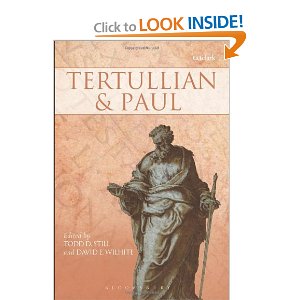There are a variety of kinds of collected essay volumes that show up regularly in the field of Biblical Studies. There are Festschrifts (festal writings honoring the birthday of some senior scholar, usually put together by his doctoral students), there are collected essays by one particular scholar that reflect work he has done over many years (see my What’s in a Word?), there are collected essays on a particular Biblical theological or ethic topic, say the resurrection (e.g. 4 Views on the Resurrection), and then there are attempts to assess the legacy of a particular Biblical figure. There have been a good many of these sorts of volumes on Paul over the last twenty years, and now we have a very particular one of considerable interest entitled Tertullian and Paul.
This particular volume, not surprisingly, enlists not just Biblical scholars but also scholars who are experts in patristics or some other aspect of early Christian history. In that sense this is an inter-disciplinary volume. Few would dispute that Tertullian was one of the heavyweights when it comes to theologians early in the post-apostolic era. It has also long been recognized that he had a considerable indebtedness to Paul and his writings, indeed Tertullian is an early witness that there must have been a collection of Paul’s writings circulating from a rather early date (a collection probably referred to in 2 Peter 3.15-16). It is thus quite appropriate to have a collection of essays that centers on the Pauline legacy as refracted through the prism known as Tertullian.
One of the things that makes this volume interesting is that you have, in six cases, essays by top flight scholars, to which other scholars respond. So for example, David Wilhite has offered an essay on Tertullian’s indebtedness to Pauline pneumatology, and Jimmy Dunn has provided a response or critique to the Wilhite essay. Or again Geoffrey Dunn provides an essay on Tertullian’s and Paul’s views on Israel to which John Barclay (of Durham!) provides a response. This makes the volume more dialogical in character and enhances its usefulness. But its not just theological topics that are treated this way, we have for instance an essay on Tertullian and Paul’s views on wealth by Helen Rhee, and a response by Warren Carter. Yours truly has an essay in this volume as well on Paul’s and Tertullian’s eschatology, building on the essay of William Tabernee.
This volume is important because it deals with the ongoing impact of the writings of the NT on early Christian thinkers who will have never met someone like Paul, but nonetheless had been influenced by his writings. Typically volumes of this sort have stronger and weaker essays, and this one is no different, but there is no filler or extraneous matter in this volume. It’s full of interesting substance. Todd Still and his Baylor colleague David Wilhite are to be commended for cajoling a cadre of busy scholars into writing yet one more essay for this volume, and I must admit I have a sort of personal stake in the volume—- it is dedicated to our daughter Christy who died a year ago in this season of the year. I’m sure she would be pleased.
On another note, unfortunately I have to report that this is one of those volumes that you either have to save up your shekels for (even on Amazon discount its $77.00) or you have to persuade your library folks to buy a copy. This unfortunately will mean the volume will have less of a circulation than it deserves, and perhaps going forward Bloomsbury/T+T Clark can figure out a way to offer this volume in paperback and thus make it more accessible.














